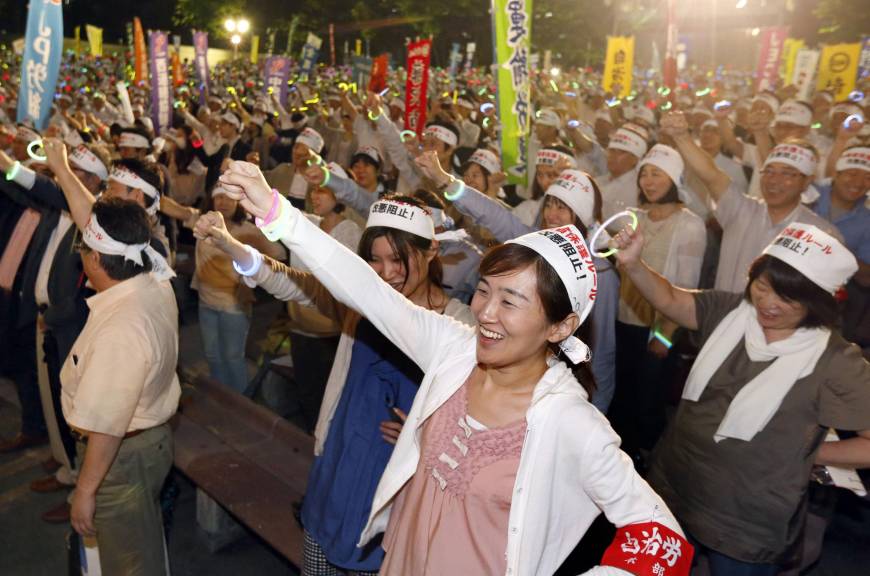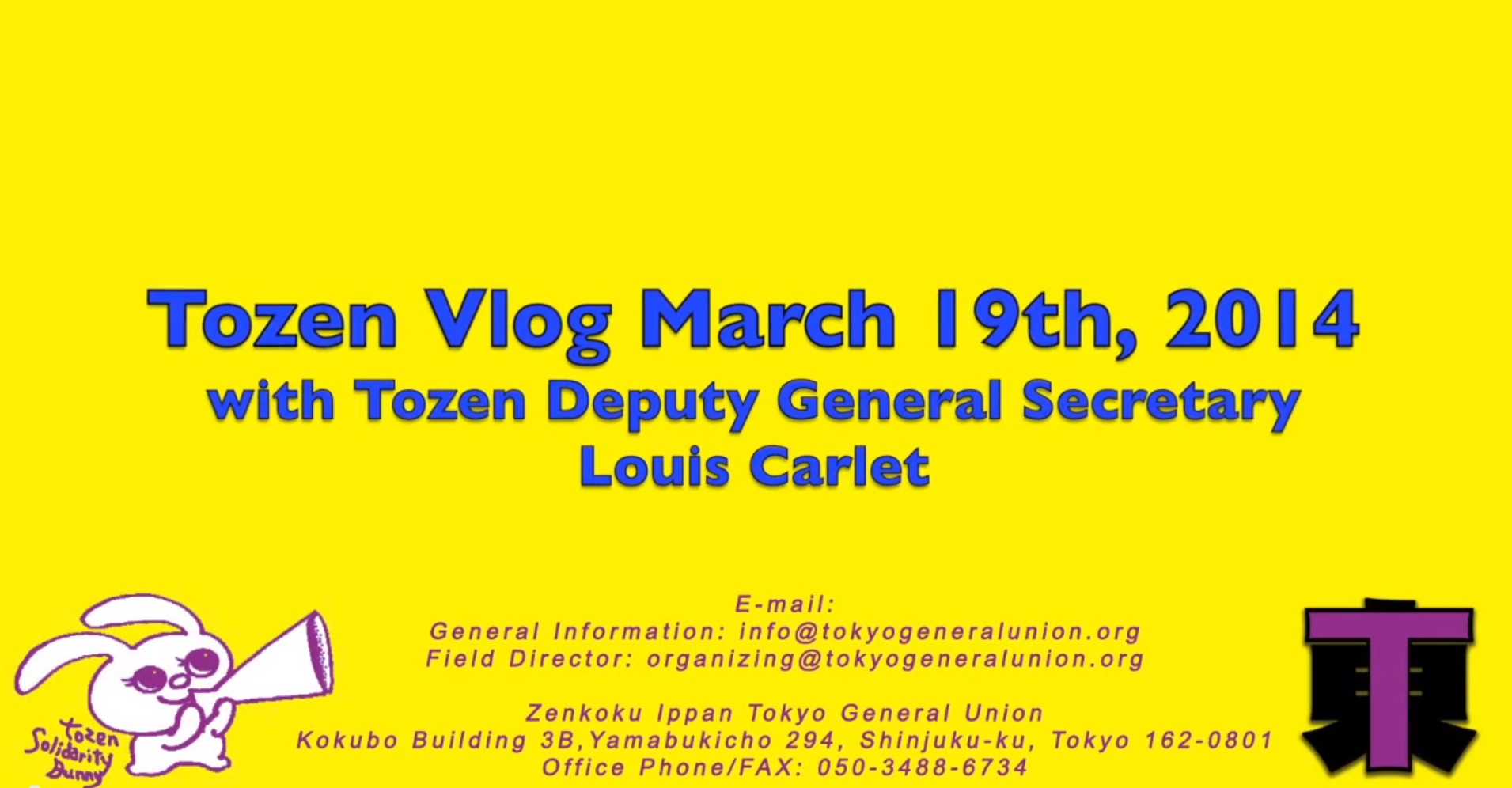Zenkoku Ippan Tokyo General Union and its Tozen ALTs Branch recently declared the existence of its Joytalk Shop to management and submitted a slate of 28 collective bargaining demands.
組合加入通知並びに団体交渉申し入れ書
Declaration of New Members, Request for Collective Bargaining
拝啓 貴社におかれましては、益々ご繁栄のこととお喜び申し上げます。
We hope your business is doing well.
さて、このたび私たちは、貴社従業員の全国一般東京ゼネラルユニオン(以下、「組合」という)ならびに全国一般東京ゼネラルユニオン東ゼンALT支部(以下、「支部」という)への加入を通知いたします。貴社は本日より、組合員の雇用・労働条件ならびに、その他労働条件に関連する事項について、当組合ならびに支部と協議決定する義務のあることを申し添えます。
We hereby inform you that some of your employees have joined Zenkoku Ippan Tokyo General Union (hereafter, “union,”) and Zenkoku Ippan Tokyo General Union Tozen ALTs (hereafter, “local”). From this day forth, your company is obligated to negotiate with the union and local regarding union members’ employment, working conditions and all items related to working conditions.
当組合ならびに支部は、良好な労使関係を確立するために、誠意をもって交渉に臨む所存です。貴社におかれましては、速やかに当組合ならびに支部との団体交渉に応じるよう要請いたします。なお、団体交渉を拒否することは、労働組合法第7条に違反する不当労働行為に該当することを念のために申し添えます。
Our union and local will negotiate in good faith in order to establish a positive labor-management relationship. Therefore, we ask that you promptly agree to collective bargaining with the union and local without committing any unfair labor practices. We also add that refusing collective bargaining is an unfair labor practice in violation of Article 7 of Trade Union Law.
以下の要求事項を議題とし、以下の日時・場所で、団体交渉を申し入れます。
We ask for collective bargaining regarding the demands listed below at the below date, time and venue.
なお、今回、要求事項が28項目と多岐にわたりましたが、第1回団交でこのすべてについて話し合うことは到底できないことは承知しておりますので、どこから話し合うかという点についても、貴社と丁寧に協議を尽くしたいと考えています。組合員は、長期的に安定した雇用を確保し、引き続き貴社と良好な関係を築いていくことを望んでおります。当方の趣旨をお汲みとりいただきますよう、何卒宜しくお願いいたします。
We understand that it is impossible to discuss all 28 demands at the first collective bargaining session. We would like to negotiate these demands with you carefully and thoroughly. Union members hope to build and maintain a positive relationship with management based on long-term job security.
…
3.要求事項 Demands
安定した雇用について On job security…
1. Management eliminate temporary employment status for all union members, recognizing open-ended employment with no deterioration in working conditions in order to give members job security.
会社は、安定した雇用を実現するため、全組合員に対し、労働条件を悪化することなく、有期雇用の雇用形態を廃止し、期間の定めのない雇用を認める。
事前協議について On prior consultation …
2. Management inform the local and union well in advance of any changes to working conditions, management, terms of employment or shugyo kisoku work rules. Management negotiate and obtain agreement with union and local before implementing any such changes.
会社は、組合員の従来の契約内容・労働条件を変更する場合、また就業規則を変更する場合、事前に時間的な余裕をもって組合ならびに支部に通知し、協議の上、同意を得て実施すること。
3. Management inform, negotiate with and obtain agreement from union and local before any transfers, disciplinary measures or dismissal (including all forms of employment severance against the wishes of the employee) of any union member.
会社は、組合員の人事異動、懲戒処分、解雇(本人の意思に反するあらゆる雇用終了を含む)を行う場合、事前に組合ならびに支部に通知し、協議の上、同意を得て実施すること。
4. Management inform and make a mutual arrangement with local members before visiting schools to observe classes etc. and that any such visit shall have a minimum of one month’s advance notice.
会社は、授業参観などの目的で組合員の学校へ訪問する場合、該当組合員に1カ月以上の予告をし、組合員の都合に合わせて訪問の日程を決めること。
5. Management obtain consent from any union member before scheduling work on weekends.
会社は、全組合員に対し、土日の勤務を組む場合、事前に該当する組合員の同意を得ること。
透明性について On transparency …
6. Management provide union and local with Japanese language and English language versions of their shugyo kisoku official work rules.
会社は、組合員に適用される就業規則の日本語版と英語版の両方を組合ならびに支部に交付すること。
7. Management immediately disclose and explain each year’s financial documents, including profit-loss statement and balance sheet.
会社は、毎年の損益計算書、貸借対照表などの財務諸表について、速やかに組合ならびに支部に公開し、説明すること。
8. Management immediately give to the union and local a copy of the contract between company and all school boards where members work.
会社は、会社と組合員が働いている全ての教育委員会との間に締結されている契約書の写しを組合ならびに支部に付与すること。
9. Management explain in writing to the union and local the terms of the contract (“haken” or “gyomu itaku”) for each member, and how the type of contract affects the member’s work.
会社は、会社と教育委員会との間で締結している契約(上記第7条を参照)が派遣なのか、業務委託なのかといった契約形態について、組合ならびに支部に文書で明らかにし、併せて組合員の労働環境に与える影響を説明した文書を組合ならびに支部に付与すること。
金銭要求 Financial Demands
10. Management pay full actual transportation costs to all members.
会社は、全組合員に対し、交通費の実費を支給すること。
11. Management increase the salary of union members to ¥290,000 per month.
会社は、全組合員の賃金を月290,000円に引き上げること。
12. Management count the training days forced upon members during July as additional working days to be paid at an additional ¥15,000 per day and refund full actual transportation costs.
会社は、全組合員に対し、7月に働かされる研修の日を労働日とし、日給15,000円および交通費の実費を追加に支給すること。
13. Management pay a full salary for August 2011
会社は、全組合員に対し、2011年8月について、1カ月分の全額の賃金を支給すること。
14. Management refrain from deducting any wages from any member who participates in collective bargaining during work hours.
会社は、所定時間内に開催する団体交渉出席者の賃金カットを行なわないこと。
15. Management refund all costs for medical checks required of union members.
会社は、組合員に健康診断を義務付ける場合、その費用の全額を負担すること。
…
他の要求事項 Other Demands
18. Management give 10 days paid annual leave to union members who have worked for six months (12 after 18 months, etc. according to Labor Standards Law) to be used at their own discretion, and not as management dictates.
会社は、全組合員に対し、労働基準法に則り、6カ月勤続後10日間、18カ月勤続後12日間等の年次有給休暇について、本人が自由に取得できることを認めること。
19. A substitute ALT is not sent to a school if there are no lessons.
会社は授業の無い日に代行ALTを派遣しないこと。
20. Management use teacher evaluations only to help teachers further improve their performance and not let evaluations affect pay. All evaluations submitted by the school to the company are shown to the union in their original form.
会社は、教員の評価を賃金などに一切反映させず、該当する教員の能力・技術等の改善という目的に限定すること。会社は教育委員会が会社に提出する評価書の写しを、組合並びに支部に付与すること。
21. Management change our payday from the 25th of the month to the 15th of every month, to coincide with monthly payments such as rent and utilities.
会社は、給与支払日を家賃や光熱費などの支払いに合わせて、現在の翌月の25日から翌月の15日に変更すること。
22. Management assign teachers with experience to run training sessions.
会社は、研修を行うトレーナーの任命については、ALT経験を持つ人に限ること。
23. Management arrange for all union members to have lockers at their workplaces (schools).
会社は、全組合員に対し、職場である学校の中に個人用ロッカーを手配すること。
24. Management explain about their current shakai hoken deductions
会社は社会保険の控除の詳細について組合並びに支部に文書で説明すること。
労使の信頼関係維持について Maintaining Relationship of Trust between Management and Union
25. Management comply with all articles of all labor laws, particularly Trade Union Law, and refrain from discriminating against or harassing any union member.
会社は、労働組合法をはじめ全ての労働法規を遵守し、いかなる組合員に対する差別行為、いやがらせ行為などをしないこと。
26. Management permit a union representative be present at all members’ meetings with management.
会社は、経営側が組合員と面談をする場合、組合の代表する者の立ち会いを認めること。
27. Management permit the union and local to conduct a 30-minutes union orientation, including passing out information, at all training sessions. Management inform the union at least four weeks in advance of the date, time and venue for all such training sessions.
会社は、全ての研修会に、組合ならびに支部に、情報配布などを含めた30分のオリエンテーション(説明会)を行うことを許可すること。なお会社は、研修を行う4週間前に、日時・場所などを組合ならびに支部に通知すること。
28. Management sign a labor-management agreement with the union and local on the above demands.
会社は、上記の要求事項に基づいて、組合ならびに支部と労働協約を締結すること。
以上


